Vienna Convention on the Law of Treaties
VerifiedAdded on 2022/08/23
|14
|3496
|15
AI Summary
Contribute Materials
Your contribution can guide someone’s learning journey. Share your
documents today.
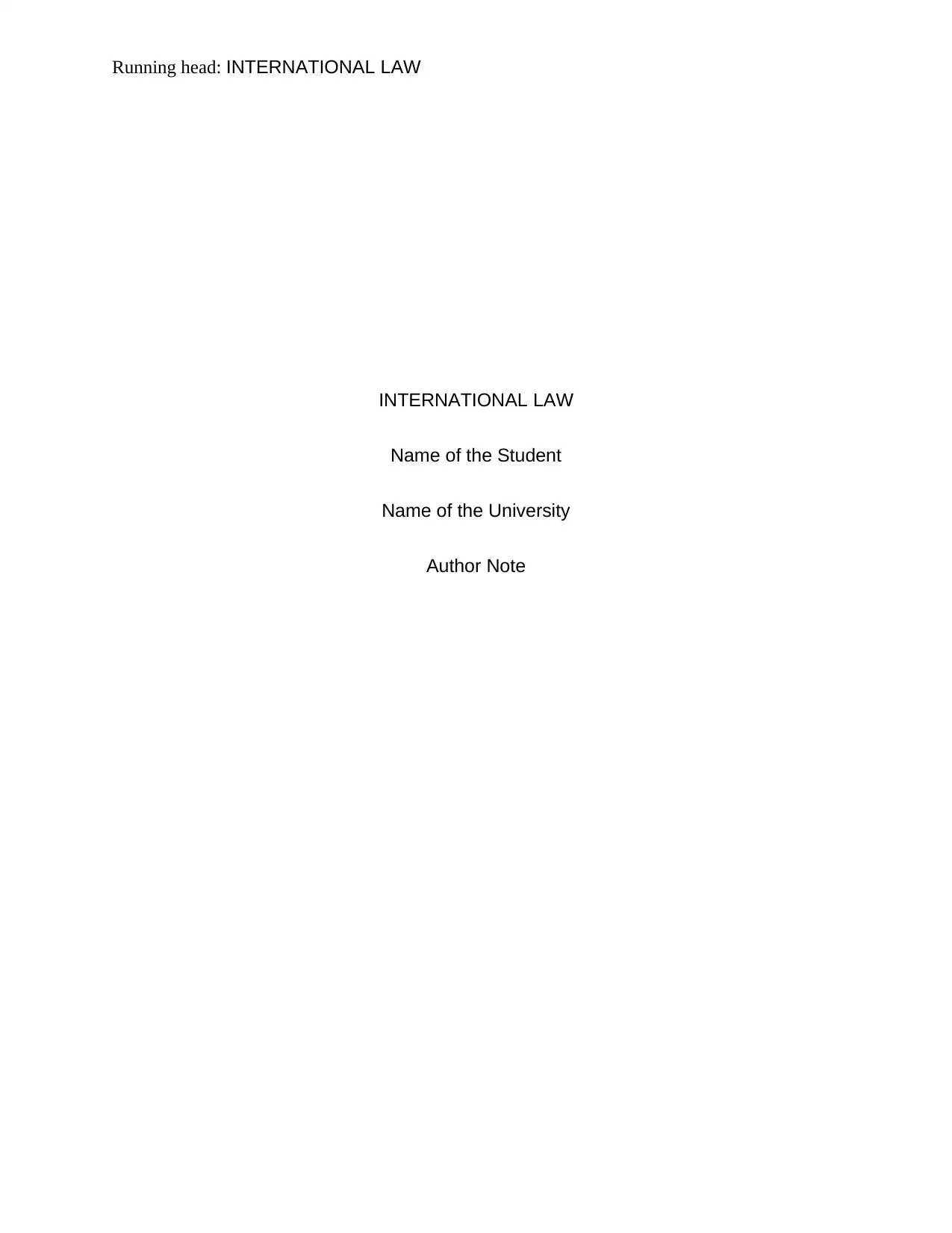
Running head: INTERNATIONAL LAW
INTERNATIONAL LAW
Name of the Student
Name of the University
Author Note
INTERNATIONAL LAW
Name of the Student
Name of the University
Author Note
Secure Best Marks with AI Grader
Need help grading? Try our AI Grader for instant feedback on your assignments.
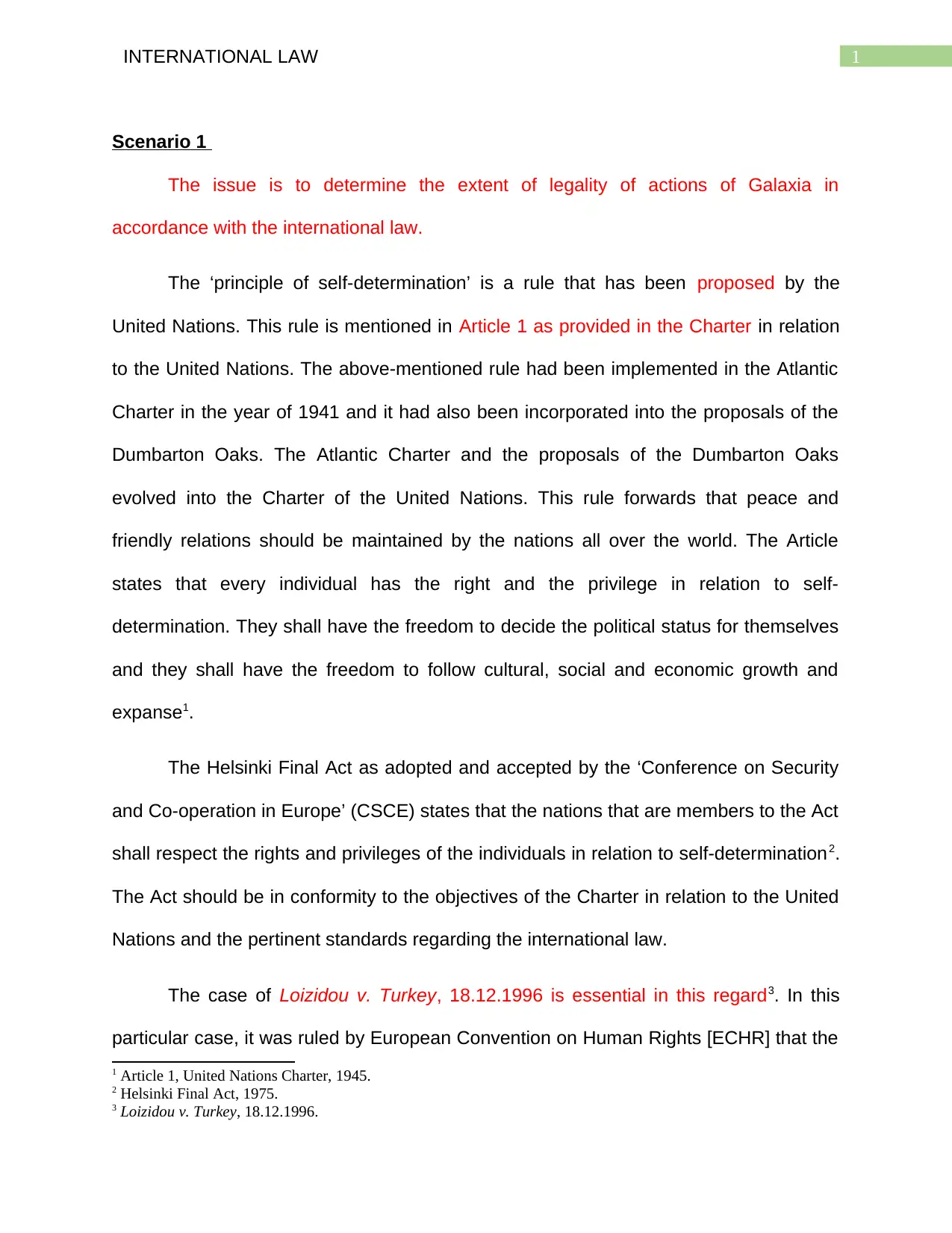
1INTERNATIONAL LAW
Scenario 1
The issue is to determine the extent of legality of actions of Galaxia in
accordance with the international law.
The ‘principle of self-determination’ is a rule that has been proposed by the
United Nations. This rule is mentioned in Article 1 as provided in the Charter in relation
to the United Nations. The above-mentioned rule had been implemented in the Atlantic
Charter in the year of 1941 and it had also been incorporated into the proposals of the
Dumbarton Oaks. The Atlantic Charter and the proposals of the Dumbarton Oaks
evolved into the Charter of the United Nations. This rule forwards that peace and
friendly relations should be maintained by the nations all over the world. The Article
states that every individual has the right and the privilege in relation to self-
determination. They shall have the freedom to decide the political status for themselves
and they shall have the freedom to follow cultural, social and economic growth and
expanse1.
The Helsinki Final Act as adopted and accepted by the ‘Conference on Security
and Co-operation in Europe’ (CSCE) states that the nations that are members to the Act
shall respect the rights and privileges of the individuals in relation to self-determination2.
The Act should be in conformity to the objectives of the Charter in relation to the United
Nations and the pertinent standards regarding the international law.
The case of Loizidou v. Turkey, 18.12.1996 is essential in this regard3. In this
particular case, it was ruled by European Convention on Human Rights [ECHR] that the
1 Article 1, United Nations Charter, 1945.
2 Helsinki Final Act, 1975.
3 Loizidou v. Turkey, 18.12.1996.
Scenario 1
The issue is to determine the extent of legality of actions of Galaxia in
accordance with the international law.
The ‘principle of self-determination’ is a rule that has been proposed by the
United Nations. This rule is mentioned in Article 1 as provided in the Charter in relation
to the United Nations. The above-mentioned rule had been implemented in the Atlantic
Charter in the year of 1941 and it had also been incorporated into the proposals of the
Dumbarton Oaks. The Atlantic Charter and the proposals of the Dumbarton Oaks
evolved into the Charter of the United Nations. This rule forwards that peace and
friendly relations should be maintained by the nations all over the world. The Article
states that every individual has the right and the privilege in relation to self-
determination. They shall have the freedom to decide the political status for themselves
and they shall have the freedom to follow cultural, social and economic growth and
expanse1.
The Helsinki Final Act as adopted and accepted by the ‘Conference on Security
and Co-operation in Europe’ (CSCE) states that the nations that are members to the Act
shall respect the rights and privileges of the individuals in relation to self-determination2.
The Act should be in conformity to the objectives of the Charter in relation to the United
Nations and the pertinent standards regarding the international law.
The case of Loizidou v. Turkey, 18.12.1996 is essential in this regard3. In this
particular case, it was ruled by European Convention on Human Rights [ECHR] that the
1 Article 1, United Nations Charter, 1945.
2 Helsinki Final Act, 1975.
3 Loizidou v. Turkey, 18.12.1996.
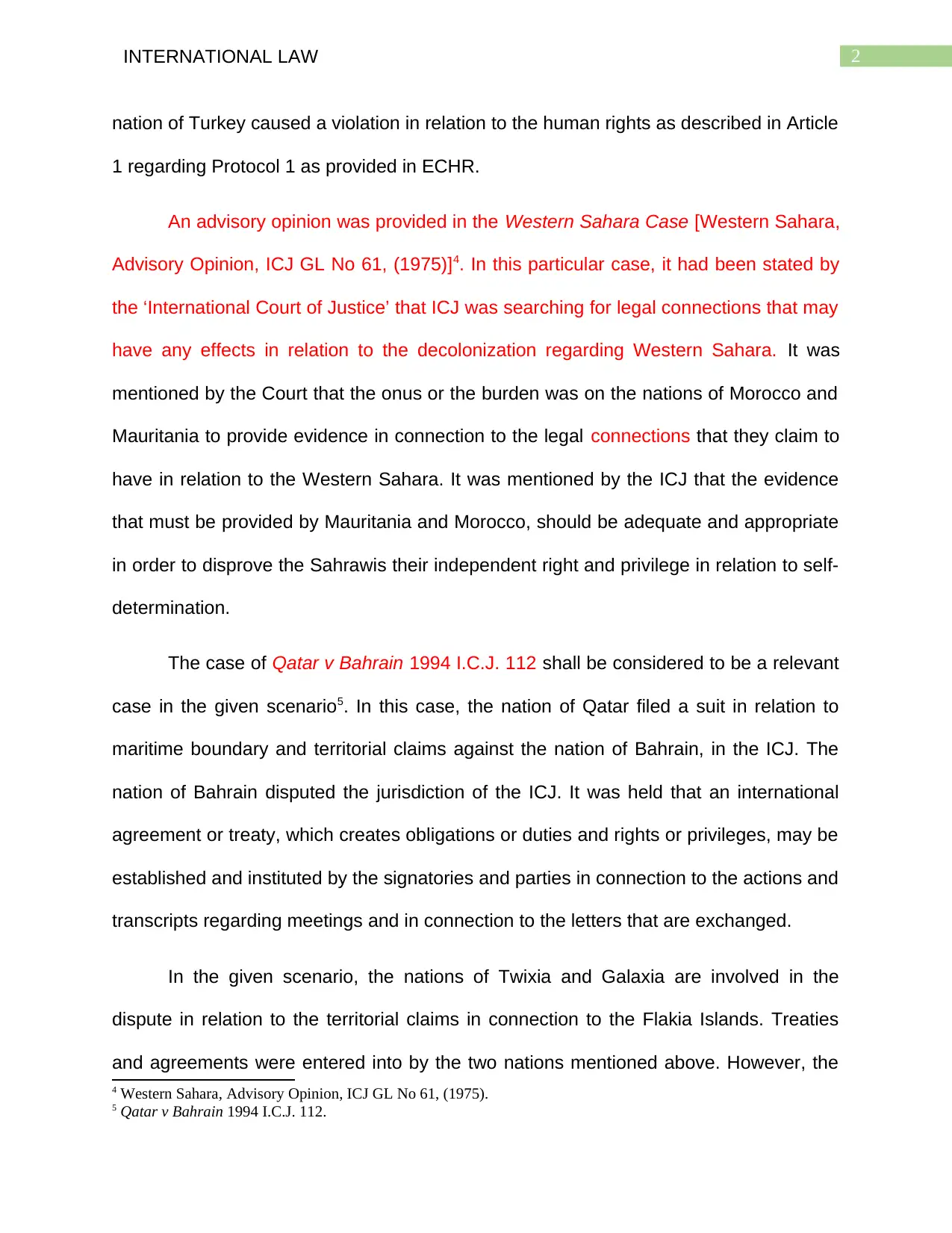
2INTERNATIONAL LAW
nation of Turkey caused a violation in relation to the human rights as described in Article
1 regarding Protocol 1 as provided in ECHR.
An advisory opinion was provided in the Western Sahara Case [Western Sahara,
Advisory Opinion, ICJ GL No 61, (1975)]4. In this particular case, it had been stated by
the ‘International Court of Justice’ that ICJ was searching for legal connections that may
have any effects in relation to the decolonization regarding Western Sahara. It was
mentioned by the Court that the onus or the burden was on the nations of Morocco and
Mauritania to provide evidence in connection to the legal connections that they claim to
have in relation to the Western Sahara. It was mentioned by the ICJ that the evidence
that must be provided by Mauritania and Morocco, should be adequate and appropriate
in order to disprove the Sahrawis their independent right and privilege in relation to self-
determination.
The case of Qatar v Bahrain 1994 I.C.J. 112 shall be considered to be a relevant
case in the given scenario5. In this case, the nation of Qatar filed a suit in relation to
maritime boundary and territorial claims against the nation of Bahrain, in the ICJ. The
nation of Bahrain disputed the jurisdiction of the ICJ. It was held that an international
agreement or treaty, which creates obligations or duties and rights or privileges, may be
established and instituted by the signatories and parties in connection to the actions and
transcripts regarding meetings and in connection to the letters that are exchanged.
In the given scenario, the nations of Twixia and Galaxia are involved in the
dispute in relation to the territorial claims in connection to the Flakia Islands. Treaties
and agreements were entered into by the two nations mentioned above. However, the
4 Western Sahara, Advisory Opinion, ICJ GL No 61, (1975).
5 Qatar v Bahrain 1994 I.C.J. 112.
nation of Turkey caused a violation in relation to the human rights as described in Article
1 regarding Protocol 1 as provided in ECHR.
An advisory opinion was provided in the Western Sahara Case [Western Sahara,
Advisory Opinion, ICJ GL No 61, (1975)]4. In this particular case, it had been stated by
the ‘International Court of Justice’ that ICJ was searching for legal connections that may
have any effects in relation to the decolonization regarding Western Sahara. It was
mentioned by the Court that the onus or the burden was on the nations of Morocco and
Mauritania to provide evidence in connection to the legal connections that they claim to
have in relation to the Western Sahara. It was mentioned by the ICJ that the evidence
that must be provided by Mauritania and Morocco, should be adequate and appropriate
in order to disprove the Sahrawis their independent right and privilege in relation to self-
determination.
The case of Qatar v Bahrain 1994 I.C.J. 112 shall be considered to be a relevant
case in the given scenario5. In this case, the nation of Qatar filed a suit in relation to
maritime boundary and territorial claims against the nation of Bahrain, in the ICJ. The
nation of Bahrain disputed the jurisdiction of the ICJ. It was held that an international
agreement or treaty, which creates obligations or duties and rights or privileges, may be
established and instituted by the signatories and parties in connection to the actions and
transcripts regarding meetings and in connection to the letters that are exchanged.
In the given scenario, the nations of Twixia and Galaxia are involved in the
dispute in relation to the territorial claims in connection to the Flakia Islands. Treaties
and agreements were entered into by the two nations mentioned above. However, the
4 Western Sahara, Advisory Opinion, ICJ GL No 61, (1975).
5 Qatar v Bahrain 1994 I.C.J. 112.
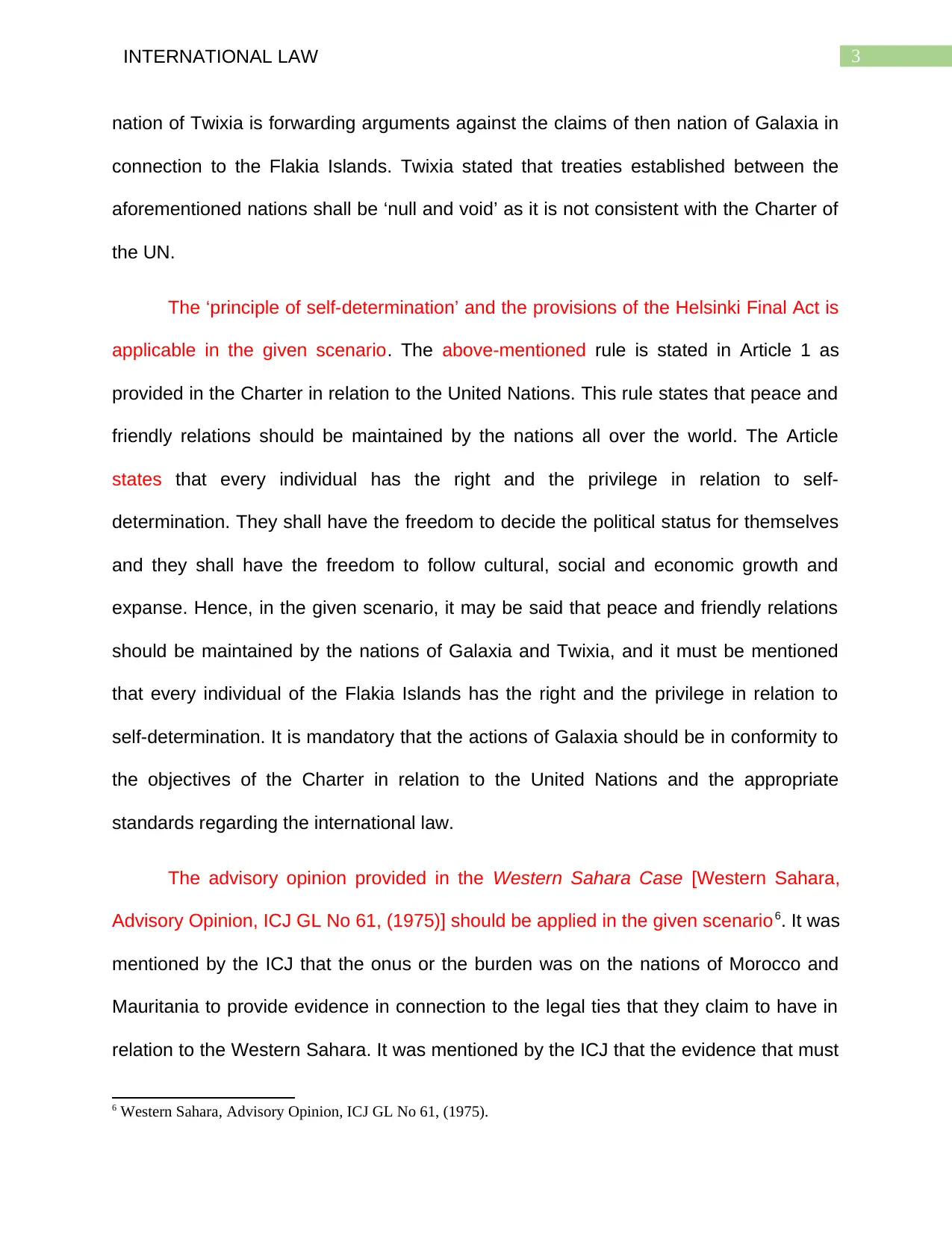
3INTERNATIONAL LAW
nation of Twixia is forwarding arguments against the claims of then nation of Galaxia in
connection to the Flakia Islands. Twixia stated that treaties established between the
aforementioned nations shall be ‘null and void’ as it is not consistent with the Charter of
the UN.
The ‘principle of self-determination’ and the provisions of the Helsinki Final Act is
applicable in the given scenario. The above-mentioned rule is stated in Article 1 as
provided in the Charter in relation to the United Nations. This rule states that peace and
friendly relations should be maintained by the nations all over the world. The Article
states that every individual has the right and the privilege in relation to self-
determination. They shall have the freedom to decide the political status for themselves
and they shall have the freedom to follow cultural, social and economic growth and
expanse. Hence, in the given scenario, it may be said that peace and friendly relations
should be maintained by the nations of Galaxia and Twixia, and it must be mentioned
that every individual of the Flakia Islands has the right and the privilege in relation to
self-determination. It is mandatory that the actions of Galaxia should be in conformity to
the objectives of the Charter in relation to the United Nations and the appropriate
standards regarding the international law.
The advisory opinion provided in the Western Sahara Case [Western Sahara,
Advisory Opinion, ICJ GL No 61, (1975)] should be applied in the given scenario6. It was
mentioned by the ICJ that the onus or the burden was on the nations of Morocco and
Mauritania to provide evidence in connection to the legal ties that they claim to have in
relation to the Western Sahara. It was mentioned by the ICJ that the evidence that must
6 Western Sahara, Advisory Opinion, ICJ GL No 61, (1975).
nation of Twixia is forwarding arguments against the claims of then nation of Galaxia in
connection to the Flakia Islands. Twixia stated that treaties established between the
aforementioned nations shall be ‘null and void’ as it is not consistent with the Charter of
the UN.
The ‘principle of self-determination’ and the provisions of the Helsinki Final Act is
applicable in the given scenario. The above-mentioned rule is stated in Article 1 as
provided in the Charter in relation to the United Nations. This rule states that peace and
friendly relations should be maintained by the nations all over the world. The Article
states that every individual has the right and the privilege in relation to self-
determination. They shall have the freedom to decide the political status for themselves
and they shall have the freedom to follow cultural, social and economic growth and
expanse. Hence, in the given scenario, it may be said that peace and friendly relations
should be maintained by the nations of Galaxia and Twixia, and it must be mentioned
that every individual of the Flakia Islands has the right and the privilege in relation to
self-determination. It is mandatory that the actions of Galaxia should be in conformity to
the objectives of the Charter in relation to the United Nations and the appropriate
standards regarding the international law.
The advisory opinion provided in the Western Sahara Case [Western Sahara,
Advisory Opinion, ICJ GL No 61, (1975)] should be applied in the given scenario6. It was
mentioned by the ICJ that the onus or the burden was on the nations of Morocco and
Mauritania to provide evidence in connection to the legal ties that they claim to have in
relation to the Western Sahara. It was mentioned by the ICJ that the evidence that must
6 Western Sahara, Advisory Opinion, ICJ GL No 61, (1975).
Secure Best Marks with AI Grader
Need help grading? Try our AI Grader for instant feedback on your assignments.
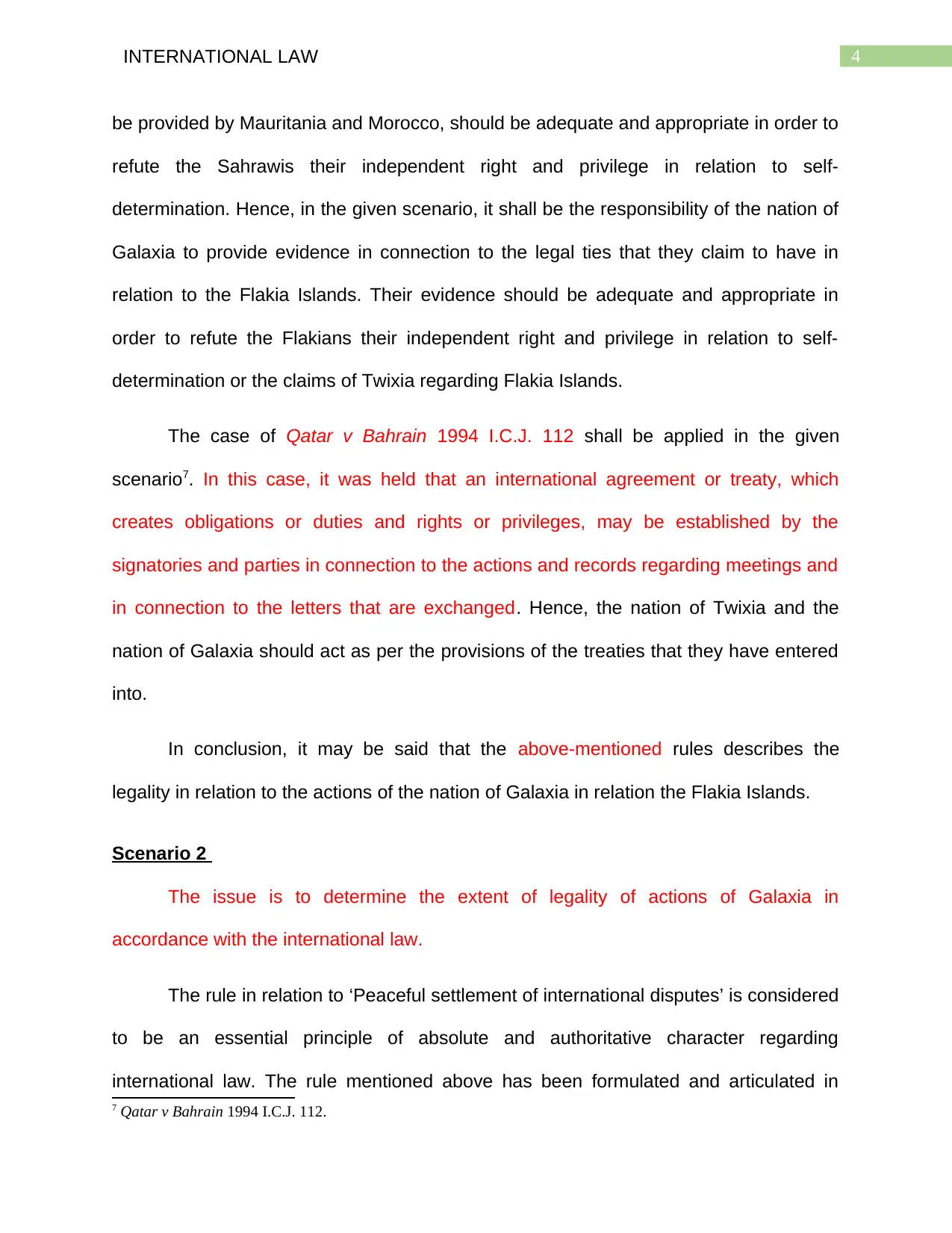
4INTERNATIONAL LAW
be provided by Mauritania and Morocco, should be adequate and appropriate in order to
refute the Sahrawis their independent right and privilege in relation to self-
determination. Hence, in the given scenario, it shall be the responsibility of the nation of
Galaxia to provide evidence in connection to the legal ties that they claim to have in
relation to the Flakia Islands. Their evidence should be adequate and appropriate in
order to refute the Flakians their independent right and privilege in relation to self-
determination or the claims of Twixia regarding Flakia Islands.
The case of Qatar v Bahrain 1994 I.C.J. 112 shall be applied in the given
scenario7. In this case, it was held that an international agreement or treaty, which
creates obligations or duties and rights or privileges, may be established by the
signatories and parties in connection to the actions and records regarding meetings and
in connection to the letters that are exchanged. Hence, the nation of Twixia and the
nation of Galaxia should act as per the provisions of the treaties that they have entered
into.
In conclusion, it may be said that the above-mentioned rules describes the
legality in relation to the actions of the nation of Galaxia in relation the Flakia Islands.
Scenario 2
The issue is to determine the extent of legality of actions of Galaxia in
accordance with the international law.
The rule in relation to ‘Peaceful settlement of international disputes’ is considered
to be an essential principle of absolute and authoritative character regarding
international law. The rule mentioned above has been formulated and articulated in
7 Qatar v Bahrain 1994 I.C.J. 112.
be provided by Mauritania and Morocco, should be adequate and appropriate in order to
refute the Sahrawis their independent right and privilege in relation to self-
determination. Hence, in the given scenario, it shall be the responsibility of the nation of
Galaxia to provide evidence in connection to the legal ties that they claim to have in
relation to the Flakia Islands. Their evidence should be adequate and appropriate in
order to refute the Flakians their independent right and privilege in relation to self-
determination or the claims of Twixia regarding Flakia Islands.
The case of Qatar v Bahrain 1994 I.C.J. 112 shall be applied in the given
scenario7. In this case, it was held that an international agreement or treaty, which
creates obligations or duties and rights or privileges, may be established by the
signatories and parties in connection to the actions and records regarding meetings and
in connection to the letters that are exchanged. Hence, the nation of Twixia and the
nation of Galaxia should act as per the provisions of the treaties that they have entered
into.
In conclusion, it may be said that the above-mentioned rules describes the
legality in relation to the actions of the nation of Galaxia in relation the Flakia Islands.
Scenario 2
The issue is to determine the extent of legality of actions of Galaxia in
accordance with the international law.
The rule in relation to ‘Peaceful settlement of international disputes’ is considered
to be an essential principle of absolute and authoritative character regarding
international law. The rule mentioned above has been formulated and articulated in
7 Qatar v Bahrain 1994 I.C.J. 112.
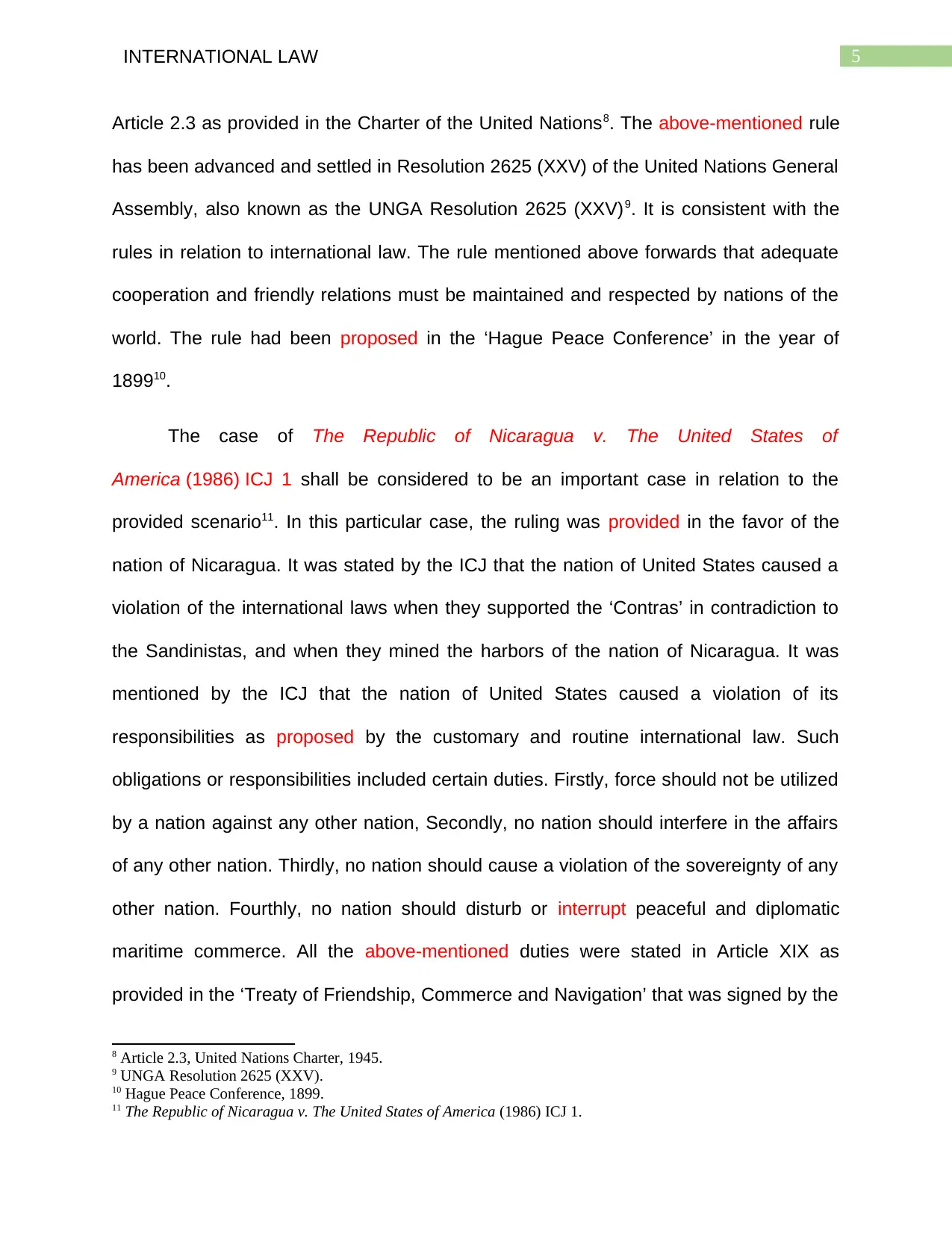
5INTERNATIONAL LAW
Article 2.3 as provided in the Charter of the United Nations8. The above-mentioned rule
has been advanced and settled in Resolution 2625 (XXV) of the United Nations General
Assembly, also known as the UNGA Resolution 2625 (XXV)9. It is consistent with the
rules in relation to international law. The rule mentioned above forwards that adequate
cooperation and friendly relations must be maintained and respected by nations of the
world. The rule had been proposed in the ‘Hague Peace Conference’ in the year of
189910.
The case of The Republic of Nicaragua v. The United States of
America (1986) ICJ 1 shall be considered to be an important case in relation to the
provided scenario11. In this particular case, the ruling was provided in the favor of the
nation of Nicaragua. It was stated by the ICJ that the nation of United States caused a
violation of the international laws when they supported the ‘Contras’ in contradiction to
the Sandinistas, and when they mined the harbors of the nation of Nicaragua. It was
mentioned by the ICJ that the nation of United States caused a violation of its
responsibilities as proposed by the customary and routine international law. Such
obligations or responsibilities included certain duties. Firstly, force should not be utilized
by a nation against any other nation, Secondly, no nation should interfere in the affairs
of any other nation. Thirdly, no nation should cause a violation of the sovereignty of any
other nation. Fourthly, no nation should disturb or interrupt peaceful and diplomatic
maritime commerce. All the above-mentioned duties were stated in Article XIX as
provided in the ‘Treaty of Friendship, Commerce and Navigation’ that was signed by the
8 Article 2.3, United Nations Charter, 1945.
9 UNGA Resolution 2625 (XXV).
10 Hague Peace Conference, 1899.
11 The Republic of Nicaragua v. The United States of America (1986) ICJ 1.
Article 2.3 as provided in the Charter of the United Nations8. The above-mentioned rule
has been advanced and settled in Resolution 2625 (XXV) of the United Nations General
Assembly, also known as the UNGA Resolution 2625 (XXV)9. It is consistent with the
rules in relation to international law. The rule mentioned above forwards that adequate
cooperation and friendly relations must be maintained and respected by nations of the
world. The rule had been proposed in the ‘Hague Peace Conference’ in the year of
189910.
The case of The Republic of Nicaragua v. The United States of
America (1986) ICJ 1 shall be considered to be an important case in relation to the
provided scenario11. In this particular case, the ruling was provided in the favor of the
nation of Nicaragua. It was stated by the ICJ that the nation of United States caused a
violation of the international laws when they supported the ‘Contras’ in contradiction to
the Sandinistas, and when they mined the harbors of the nation of Nicaragua. It was
mentioned by the ICJ that the nation of United States caused a violation of its
responsibilities as proposed by the customary and routine international law. Such
obligations or responsibilities included certain duties. Firstly, force should not be utilized
by a nation against any other nation, Secondly, no nation should interfere in the affairs
of any other nation. Thirdly, no nation should cause a violation of the sovereignty of any
other nation. Fourthly, no nation should disturb or interrupt peaceful and diplomatic
maritime commerce. All the above-mentioned duties were stated in Article XIX as
provided in the ‘Treaty of Friendship, Commerce and Navigation’ that was signed by the
8 Article 2.3, United Nations Charter, 1945.
9 UNGA Resolution 2625 (XXV).
10 Hague Peace Conference, 1899.
11 The Republic of Nicaragua v. The United States of America (1986) ICJ 1.
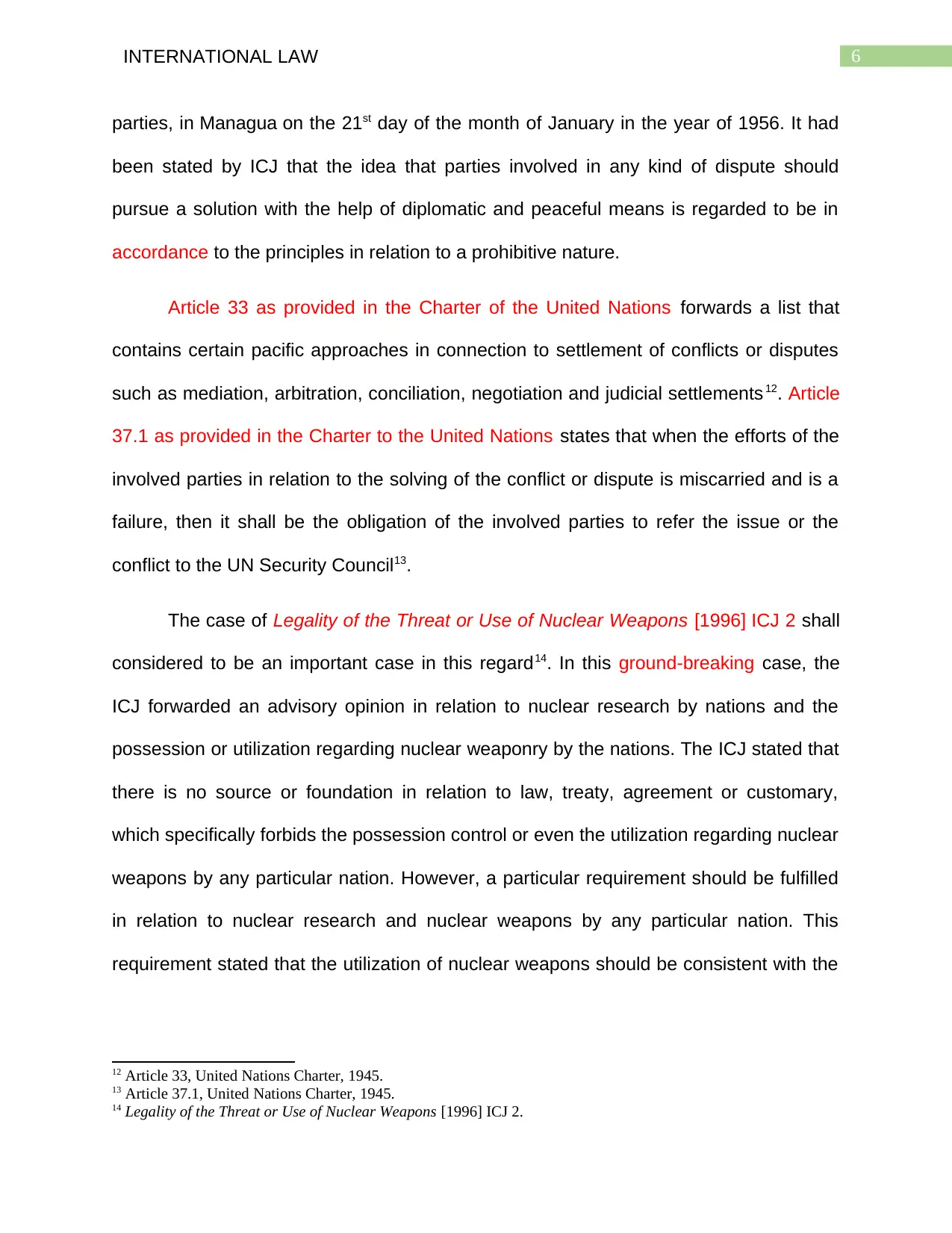
6INTERNATIONAL LAW
parties, in Managua on the 21st day of the month of January in the year of 1956. It had
been stated by ICJ that the idea that parties involved in any kind of dispute should
pursue a solution with the help of diplomatic and peaceful means is regarded to be in
accordance to the principles in relation to a prohibitive nature.
Article 33 as provided in the Charter of the United Nations forwards a list that
contains certain pacific approaches in connection to settlement of conflicts or disputes
such as mediation, arbitration, conciliation, negotiation and judicial settlements12. Article
37.1 as provided in the Charter to the United Nations states that when the efforts of the
involved parties in relation to the solving of the conflict or dispute is miscarried and is a
failure, then it shall be the obligation of the involved parties to refer the issue or the
conflict to the UN Security Council13.
The case of Legality of the Threat or Use of Nuclear Weapons [1996] ICJ 2 shall
considered to be an important case in this regard14. In this ground-breaking case, the
ICJ forwarded an advisory opinion in relation to nuclear research by nations and the
possession or utilization regarding nuclear weaponry by the nations. The ICJ stated that
there is no source or foundation in relation to law, treaty, agreement or customary,
which specifically forbids the possession control or even the utilization regarding nuclear
weapons by any particular nation. However, a particular requirement should be fulfilled
in relation to nuclear research and nuclear weapons by any particular nation. This
requirement stated that the utilization of nuclear weapons should be consistent with the
12 Article 33, United Nations Charter, 1945.
13 Article 37.1, United Nations Charter, 1945.
14 Legality of the Threat or Use of Nuclear Weapons [1996] ICJ 2.
parties, in Managua on the 21st day of the month of January in the year of 1956. It had
been stated by ICJ that the idea that parties involved in any kind of dispute should
pursue a solution with the help of diplomatic and peaceful means is regarded to be in
accordance to the principles in relation to a prohibitive nature.
Article 33 as provided in the Charter of the United Nations forwards a list that
contains certain pacific approaches in connection to settlement of conflicts or disputes
such as mediation, arbitration, conciliation, negotiation and judicial settlements12. Article
37.1 as provided in the Charter to the United Nations states that when the efforts of the
involved parties in relation to the solving of the conflict or dispute is miscarried and is a
failure, then it shall be the obligation of the involved parties to refer the issue or the
conflict to the UN Security Council13.
The case of Legality of the Threat or Use of Nuclear Weapons [1996] ICJ 2 shall
considered to be an important case in this regard14. In this ground-breaking case, the
ICJ forwarded an advisory opinion in relation to nuclear research by nations and the
possession or utilization regarding nuclear weaponry by the nations. The ICJ stated that
there is no source or foundation in relation to law, treaty, agreement or customary,
which specifically forbids the possession control or even the utilization regarding nuclear
weapons by any particular nation. However, a particular requirement should be fulfilled
in relation to nuclear research and nuclear weapons by any particular nation. This
requirement stated that the utilization of nuclear weapons should be consistent with the
12 Article 33, United Nations Charter, 1945.
13 Article 37.1, United Nations Charter, 1945.
14 Legality of the Threat or Use of Nuclear Weapons [1996] ICJ 2.
Paraphrase This Document
Need a fresh take? Get an instant paraphrase of this document with our AI Paraphraser
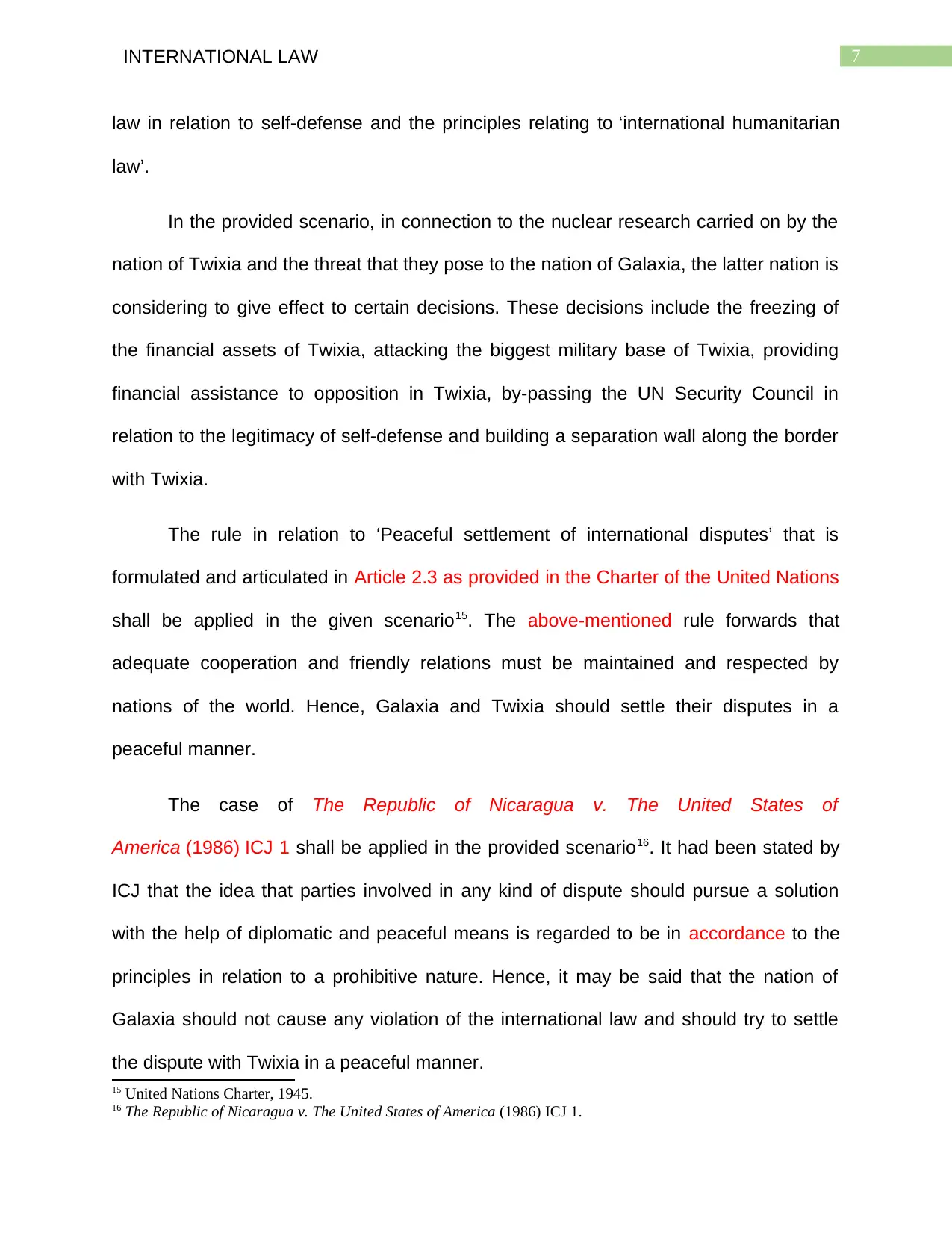
7INTERNATIONAL LAW
law in relation to self-defense and the principles relating to ‘international humanitarian
law’.
In the provided scenario, in connection to the nuclear research carried on by the
nation of Twixia and the threat that they pose to the nation of Galaxia, the latter nation is
considering to give effect to certain decisions. These decisions include the freezing of
the financial assets of Twixia, attacking the biggest military base of Twixia, providing
financial assistance to opposition in Twixia, by-passing the UN Security Council in
relation to the legitimacy of self-defense and building a separation wall along the border
with Twixia.
The rule in relation to ‘Peaceful settlement of international disputes’ that is
formulated and articulated in Article 2.3 as provided in the Charter of the United Nations
shall be applied in the given scenario15. The above-mentioned rule forwards that
adequate cooperation and friendly relations must be maintained and respected by
nations of the world. Hence, Galaxia and Twixia should settle their disputes in a
peaceful manner.
The case of The Republic of Nicaragua v. The United States of
America (1986) ICJ 1 shall be applied in the provided scenario16. It had been stated by
ICJ that the idea that parties involved in any kind of dispute should pursue a solution
with the help of diplomatic and peaceful means is regarded to be in accordance to the
principles in relation to a prohibitive nature. Hence, it may be said that the nation of
Galaxia should not cause any violation of the international law and should try to settle
the dispute with Twixia in a peaceful manner.
15 United Nations Charter, 1945.
16 The Republic of Nicaragua v. The United States of America (1986) ICJ 1.
law in relation to self-defense and the principles relating to ‘international humanitarian
law’.
In the provided scenario, in connection to the nuclear research carried on by the
nation of Twixia and the threat that they pose to the nation of Galaxia, the latter nation is
considering to give effect to certain decisions. These decisions include the freezing of
the financial assets of Twixia, attacking the biggest military base of Twixia, providing
financial assistance to opposition in Twixia, by-passing the UN Security Council in
relation to the legitimacy of self-defense and building a separation wall along the border
with Twixia.
The rule in relation to ‘Peaceful settlement of international disputes’ that is
formulated and articulated in Article 2.3 as provided in the Charter of the United Nations
shall be applied in the given scenario15. The above-mentioned rule forwards that
adequate cooperation and friendly relations must be maintained and respected by
nations of the world. Hence, Galaxia and Twixia should settle their disputes in a
peaceful manner.
The case of The Republic of Nicaragua v. The United States of
America (1986) ICJ 1 shall be applied in the provided scenario16. It had been stated by
ICJ that the idea that parties involved in any kind of dispute should pursue a solution
with the help of diplomatic and peaceful means is regarded to be in accordance to the
principles in relation to a prohibitive nature. Hence, it may be said that the nation of
Galaxia should not cause any violation of the international law and should try to settle
the dispute with Twixia in a peaceful manner.
15 United Nations Charter, 1945.
16 The Republic of Nicaragua v. The United States of America (1986) ICJ 1.
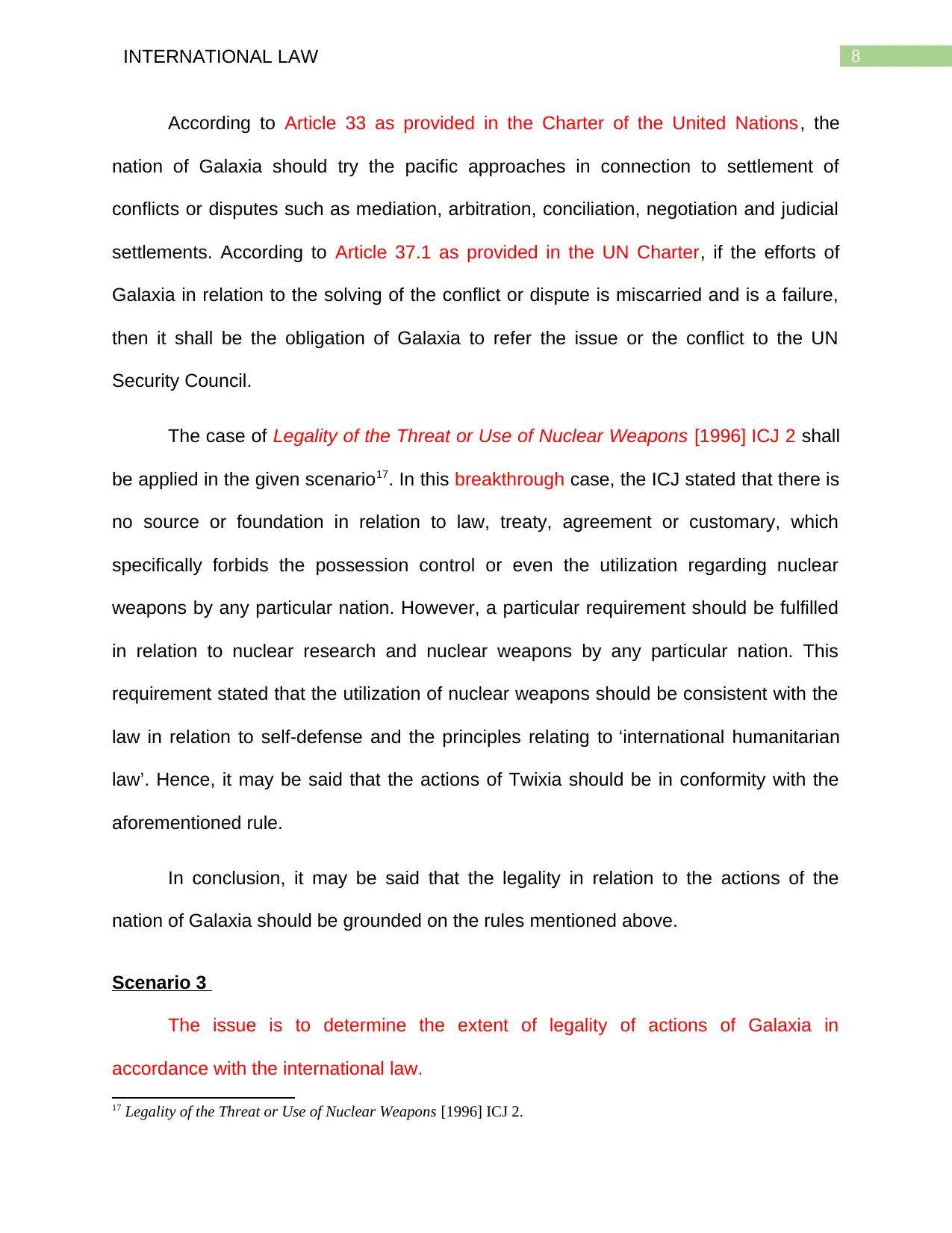
8INTERNATIONAL LAW
According to Article 33 as provided in the Charter of the United Nations, the
nation of Galaxia should try the pacific approaches in connection to settlement of
conflicts or disputes such as mediation, arbitration, conciliation, negotiation and judicial
settlements. According to Article 37.1 as provided in the UN Charter, if the efforts of
Galaxia in relation to the solving of the conflict or dispute is miscarried and is a failure,
then it shall be the obligation of Galaxia to refer the issue or the conflict to the UN
Security Council.
The case of Legality of the Threat or Use of Nuclear Weapons [1996] ICJ 2 shall
be applied in the given scenario17. In this breakthrough case, the ICJ stated that there is
no source or foundation in relation to law, treaty, agreement or customary, which
specifically forbids the possession control or even the utilization regarding nuclear
weapons by any particular nation. However, a particular requirement should be fulfilled
in relation to nuclear research and nuclear weapons by any particular nation. This
requirement stated that the utilization of nuclear weapons should be consistent with the
law in relation to self-defense and the principles relating to ‘international humanitarian
law’. Hence, it may be said that the actions of Twixia should be in conformity with the
aforementioned rule.
In conclusion, it may be said that the legality in relation to the actions of the
nation of Galaxia should be grounded on the rules mentioned above.
Scenario 3
The issue is to determine the extent of legality of actions of Galaxia in
accordance with the international law.
17 Legality of the Threat or Use of Nuclear Weapons [1996] ICJ 2.
According to Article 33 as provided in the Charter of the United Nations, the
nation of Galaxia should try the pacific approaches in connection to settlement of
conflicts or disputes such as mediation, arbitration, conciliation, negotiation and judicial
settlements. According to Article 37.1 as provided in the UN Charter, if the efforts of
Galaxia in relation to the solving of the conflict or dispute is miscarried and is a failure,
then it shall be the obligation of Galaxia to refer the issue or the conflict to the UN
Security Council.
The case of Legality of the Threat or Use of Nuclear Weapons [1996] ICJ 2 shall
be applied in the given scenario17. In this breakthrough case, the ICJ stated that there is
no source or foundation in relation to law, treaty, agreement or customary, which
specifically forbids the possession control or even the utilization regarding nuclear
weapons by any particular nation. However, a particular requirement should be fulfilled
in relation to nuclear research and nuclear weapons by any particular nation. This
requirement stated that the utilization of nuclear weapons should be consistent with the
law in relation to self-defense and the principles relating to ‘international humanitarian
law’. Hence, it may be said that the actions of Twixia should be in conformity with the
aforementioned rule.
In conclusion, it may be said that the legality in relation to the actions of the
nation of Galaxia should be grounded on the rules mentioned above.
Scenario 3
The issue is to determine the extent of legality of actions of Galaxia in
accordance with the international law.
17 Legality of the Threat or Use of Nuclear Weapons [1996] ICJ 2.
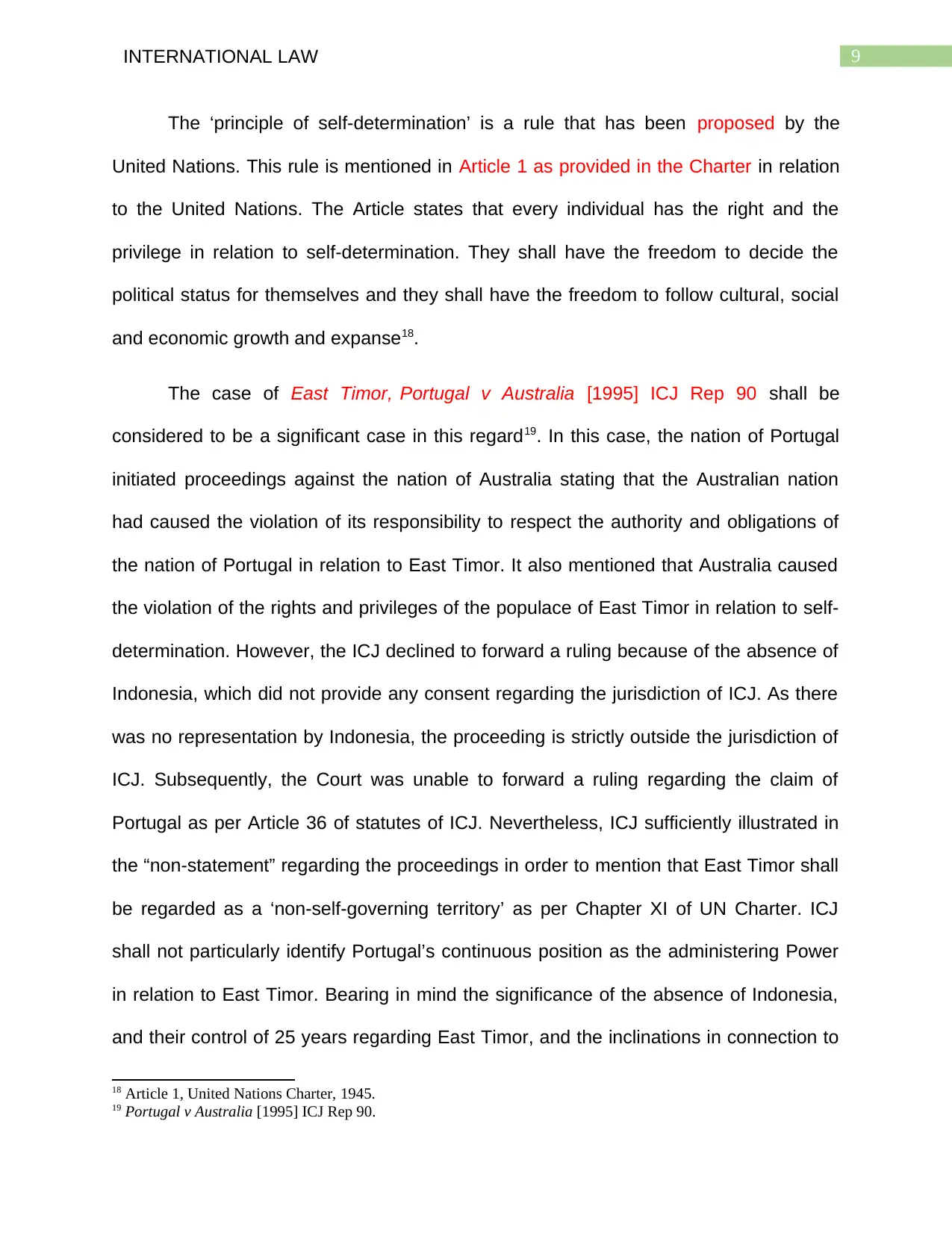
9INTERNATIONAL LAW
The ‘principle of self-determination’ is a rule that has been proposed by the
United Nations. This rule is mentioned in Article 1 as provided in the Charter in relation
to the United Nations. The Article states that every individual has the right and the
privilege in relation to self-determination. They shall have the freedom to decide the
political status for themselves and they shall have the freedom to follow cultural, social
and economic growth and expanse18.
The case of East Timor, Portugal v Australia [1995] ICJ Rep 90 shall be
considered to be a significant case in this regard19. In this case, the nation of Portugal
initiated proceedings against the nation of Australia stating that the Australian nation
had caused the violation of its responsibility to respect the authority and obligations of
the nation of Portugal in relation to East Timor. It also mentioned that Australia caused
the violation of the rights and privileges of the populace of East Timor in relation to self-
determination. However, the ICJ declined to forward a ruling because of the absence of
Indonesia, which did not provide any consent regarding the jurisdiction of ICJ. As there
was no representation by Indonesia, the proceeding is strictly outside the jurisdiction of
ICJ. Subsequently, the Court was unable to forward a ruling regarding the claim of
Portugal as per Article 36 of statutes of ICJ. Nevertheless, ICJ sufficiently illustrated in
the “non-statement” regarding the proceedings in order to mention that East Timor shall
be regarded as a ‘non-self-governing territory’ as per Chapter XI of UN Charter. ICJ
shall not particularly identify Portugal’s continuous position as the administering Power
in relation to East Timor. Bearing in mind the significance of the absence of Indonesia,
and their control of 25 years regarding East Timor, and the inclinations in connection to
18 Article 1, United Nations Charter, 1945.
19 Portugal v Australia [1995] ICJ Rep 90.
The ‘principle of self-determination’ is a rule that has been proposed by the
United Nations. This rule is mentioned in Article 1 as provided in the Charter in relation
to the United Nations. The Article states that every individual has the right and the
privilege in relation to self-determination. They shall have the freedom to decide the
political status for themselves and they shall have the freedom to follow cultural, social
and economic growth and expanse18.
The case of East Timor, Portugal v Australia [1995] ICJ Rep 90 shall be
considered to be a significant case in this regard19. In this case, the nation of Portugal
initiated proceedings against the nation of Australia stating that the Australian nation
had caused the violation of its responsibility to respect the authority and obligations of
the nation of Portugal in relation to East Timor. It also mentioned that Australia caused
the violation of the rights and privileges of the populace of East Timor in relation to self-
determination. However, the ICJ declined to forward a ruling because of the absence of
Indonesia, which did not provide any consent regarding the jurisdiction of ICJ. As there
was no representation by Indonesia, the proceeding is strictly outside the jurisdiction of
ICJ. Subsequently, the Court was unable to forward a ruling regarding the claim of
Portugal as per Article 36 of statutes of ICJ. Nevertheless, ICJ sufficiently illustrated in
the “non-statement” regarding the proceedings in order to mention that East Timor shall
be regarded as a ‘non-self-governing territory’ as per Chapter XI of UN Charter. ICJ
shall not particularly identify Portugal’s continuous position as the administering Power
in relation to East Timor. Bearing in mind the significance of the absence of Indonesia,
and their control of 25 years regarding East Timor, and the inclinations in connection to
18 Article 1, United Nations Charter, 1945.
19 Portugal v Australia [1995] ICJ Rep 90.
Secure Best Marks with AI Grader
Need help grading? Try our AI Grader for instant feedback on your assignments.
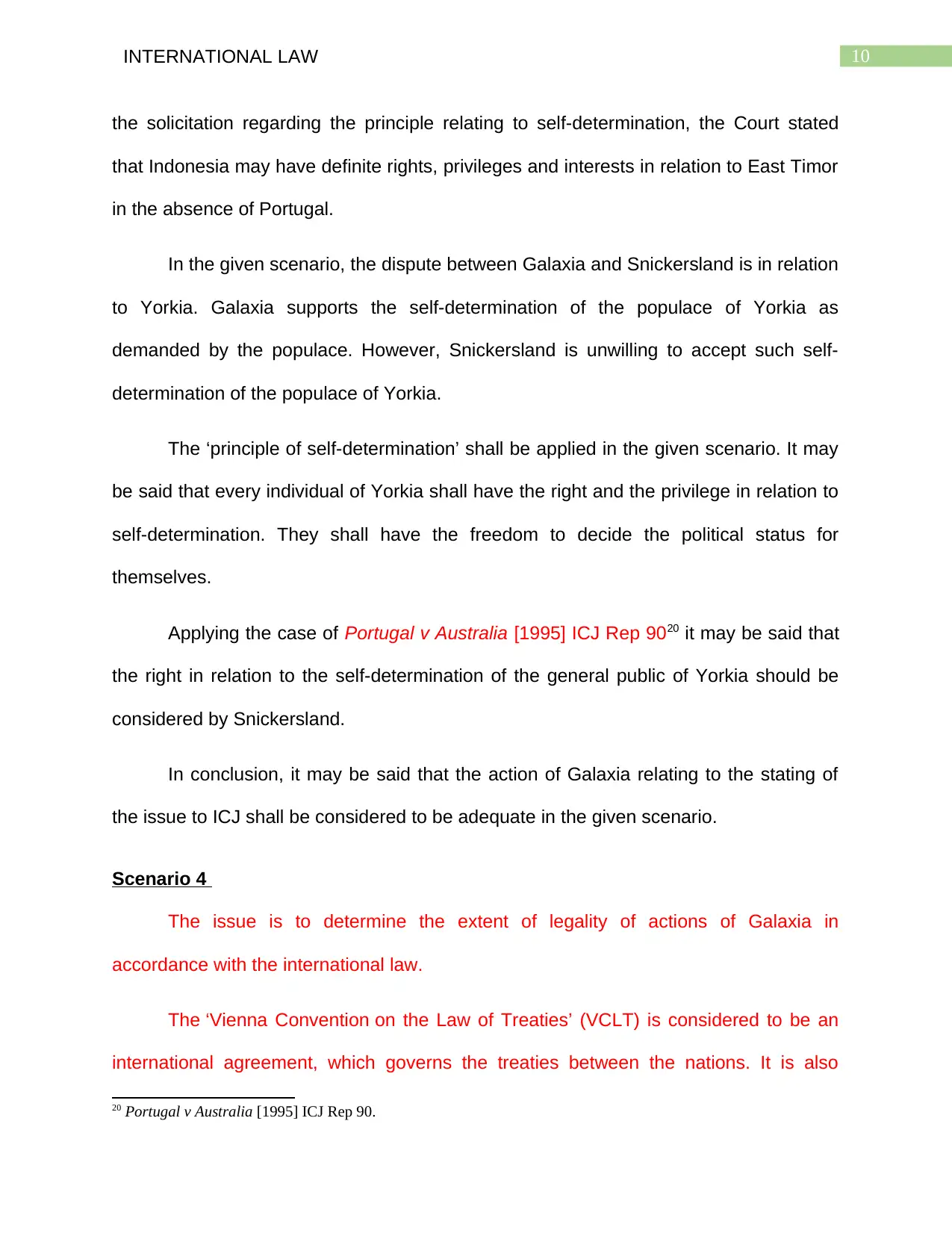
10INTERNATIONAL LAW
the solicitation regarding the principle relating to self-determination, the Court stated
that Indonesia may have definite rights, privileges and interests in relation to East Timor
in the absence of Portugal.
In the given scenario, the dispute between Galaxia and Snickersland is in relation
to Yorkia. Galaxia supports the self-determination of the populace of Yorkia as
demanded by the populace. However, Snickersland is unwilling to accept such self-
determination of the populace of Yorkia.
The ‘principle of self-determination’ shall be applied in the given scenario. It may
be said that every individual of Yorkia shall have the right and the privilege in relation to
self-determination. They shall have the freedom to decide the political status for
themselves.
Applying the case of Portugal v Australia [1995] ICJ Rep 9020 it may be said that
the right in relation to the self-determination of the general public of Yorkia should be
considered by Snickersland.
In conclusion, it may be said that the action of Galaxia relating to the stating of
the issue to ICJ shall be considered to be adequate in the given scenario.
Scenario 4
The issue is to determine the extent of legality of actions of Galaxia in
accordance with the international law.
The ‘Vienna Convention on the Law of Treaties’ (VCLT) is considered to be an
international agreement, which governs the treaties between the nations. It is also
20 Portugal v Australia [1995] ICJ Rep 90.
the solicitation regarding the principle relating to self-determination, the Court stated
that Indonesia may have definite rights, privileges and interests in relation to East Timor
in the absence of Portugal.
In the given scenario, the dispute between Galaxia and Snickersland is in relation
to Yorkia. Galaxia supports the self-determination of the populace of Yorkia as
demanded by the populace. However, Snickersland is unwilling to accept such self-
determination of the populace of Yorkia.
The ‘principle of self-determination’ shall be applied in the given scenario. It may
be said that every individual of Yorkia shall have the right and the privilege in relation to
self-determination. They shall have the freedom to decide the political status for
themselves.
Applying the case of Portugal v Australia [1995] ICJ Rep 9020 it may be said that
the right in relation to the self-determination of the general public of Yorkia should be
considered by Snickersland.
In conclusion, it may be said that the action of Galaxia relating to the stating of
the issue to ICJ shall be considered to be adequate in the given scenario.
Scenario 4
The issue is to determine the extent of legality of actions of Galaxia in
accordance with the international law.
The ‘Vienna Convention on the Law of Treaties’ (VCLT) is considered to be an
international agreement, which governs the treaties between the nations. It is also
20 Portugal v Australia [1995] ICJ Rep 90.
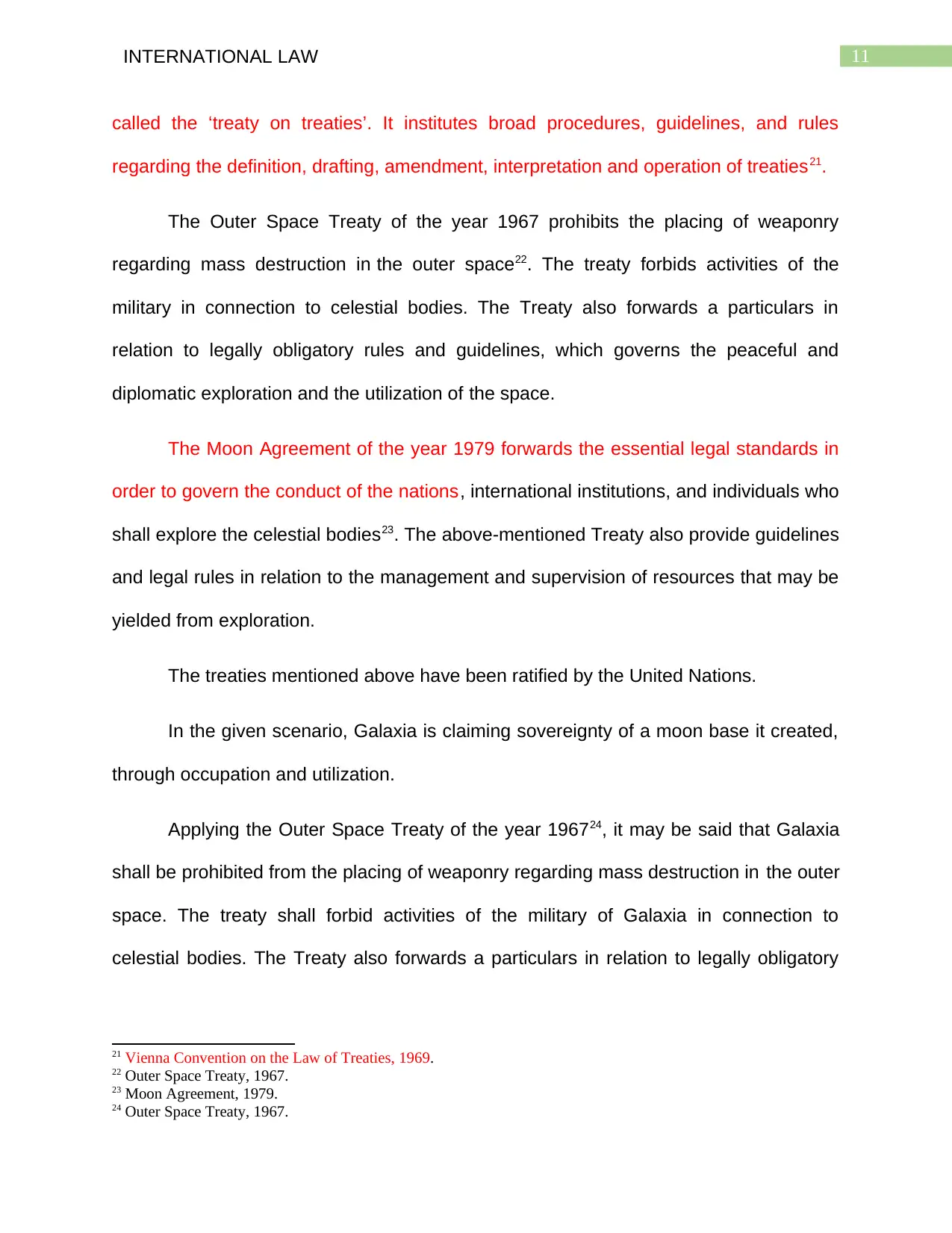
11INTERNATIONAL LAW
called the ‘treaty on treaties’. It institutes broad procedures, guidelines, and rules
regarding the definition, drafting, amendment, interpretation and operation of treaties21.
The Outer Space Treaty of the year 1967 prohibits the placing of weaponry
regarding mass destruction in the outer space22. The treaty forbids activities of the
military in connection to celestial bodies. The Treaty also forwards a particulars in
relation to legally obligatory rules and guidelines, which governs the peaceful and
diplomatic exploration and the utilization of the space.
The Moon Agreement of the year 1979 forwards the essential legal standards in
order to govern the conduct of the nations, international institutions, and individuals who
shall explore the celestial bodies23. The above-mentioned Treaty also provide guidelines
and legal rules in relation to the management and supervision of resources that may be
yielded from exploration.
The treaties mentioned above have been ratified by the United Nations.
In the given scenario, Galaxia is claiming sovereignty of a moon base it created,
through occupation and utilization.
Applying the Outer Space Treaty of the year 196724, it may be said that Galaxia
shall be prohibited from the placing of weaponry regarding mass destruction in the outer
space. The treaty shall forbid activities of the military of Galaxia in connection to
celestial bodies. The Treaty also forwards a particulars in relation to legally obligatory
21 Vienna Convention on the Law of Treaties, 1969.
22 Outer Space Treaty, 1967.
23 Moon Agreement, 1979.
24 Outer Space Treaty, 1967.
called the ‘treaty on treaties’. It institutes broad procedures, guidelines, and rules
regarding the definition, drafting, amendment, interpretation and operation of treaties21.
The Outer Space Treaty of the year 1967 prohibits the placing of weaponry
regarding mass destruction in the outer space22. The treaty forbids activities of the
military in connection to celestial bodies. The Treaty also forwards a particulars in
relation to legally obligatory rules and guidelines, which governs the peaceful and
diplomatic exploration and the utilization of the space.
The Moon Agreement of the year 1979 forwards the essential legal standards in
order to govern the conduct of the nations, international institutions, and individuals who
shall explore the celestial bodies23. The above-mentioned Treaty also provide guidelines
and legal rules in relation to the management and supervision of resources that may be
yielded from exploration.
The treaties mentioned above have been ratified by the United Nations.
In the given scenario, Galaxia is claiming sovereignty of a moon base it created,
through occupation and utilization.
Applying the Outer Space Treaty of the year 196724, it may be said that Galaxia
shall be prohibited from the placing of weaponry regarding mass destruction in the outer
space. The treaty shall forbid activities of the military of Galaxia in connection to
celestial bodies. The Treaty also forwards a particulars in relation to legally obligatory
21 Vienna Convention on the Law of Treaties, 1969.
22 Outer Space Treaty, 1967.
23 Moon Agreement, 1979.
24 Outer Space Treaty, 1967.
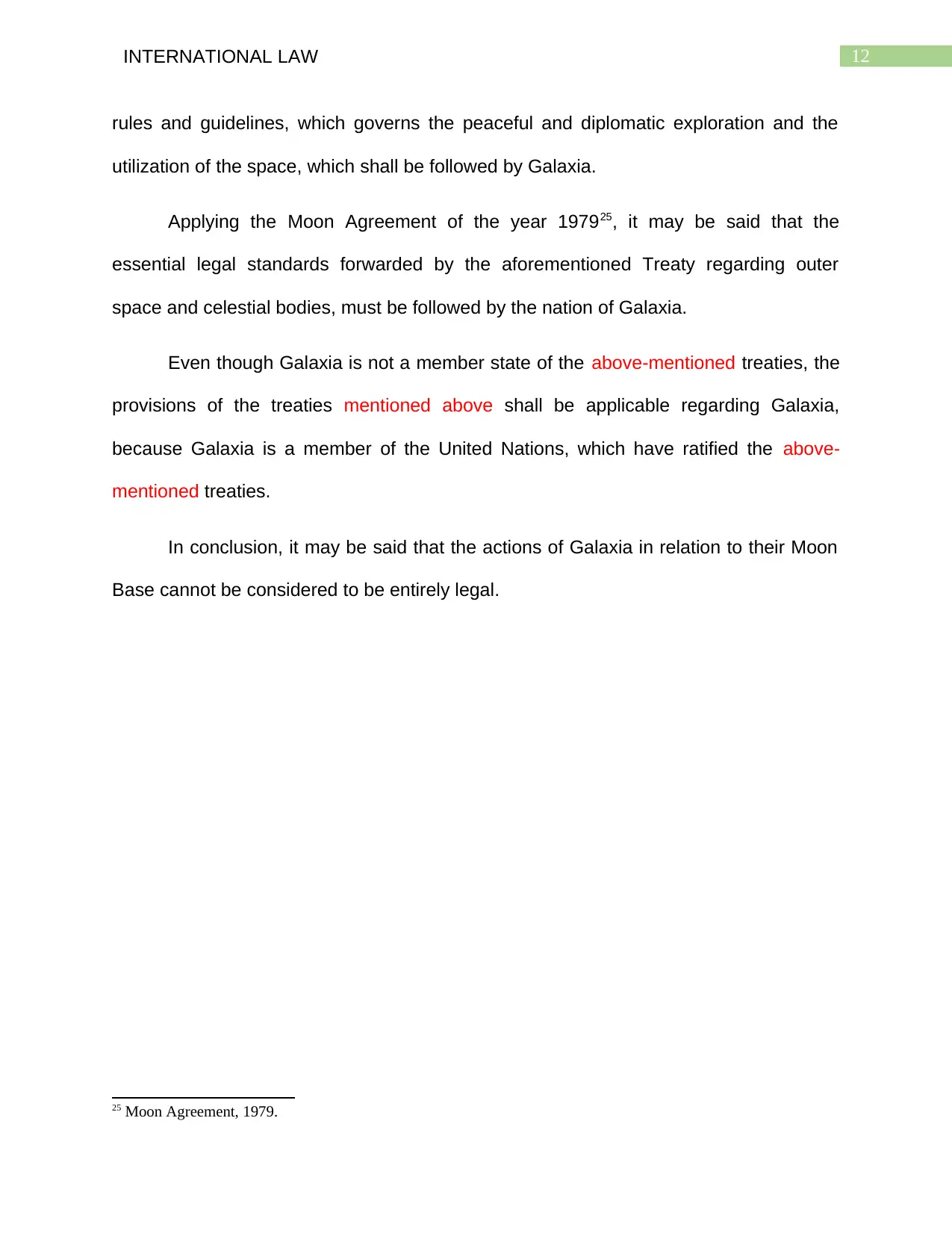
12INTERNATIONAL LAW
rules and guidelines, which governs the peaceful and diplomatic exploration and the
utilization of the space, which shall be followed by Galaxia.
Applying the Moon Agreement of the year 197925, it may be said that the
essential legal standards forwarded by the aforementioned Treaty regarding outer
space and celestial bodies, must be followed by the nation of Galaxia.
Even though Galaxia is not a member state of the above-mentioned treaties, the
provisions of the treaties mentioned above shall be applicable regarding Galaxia,
because Galaxia is a member of the United Nations, which have ratified the above-
mentioned treaties.
In conclusion, it may be said that the actions of Galaxia in relation to their Moon
Base cannot be considered to be entirely legal.
25 Moon Agreement, 1979.
rules and guidelines, which governs the peaceful and diplomatic exploration and the
utilization of the space, which shall be followed by Galaxia.
Applying the Moon Agreement of the year 197925, it may be said that the
essential legal standards forwarded by the aforementioned Treaty regarding outer
space and celestial bodies, must be followed by the nation of Galaxia.
Even though Galaxia is not a member state of the above-mentioned treaties, the
provisions of the treaties mentioned above shall be applicable regarding Galaxia,
because Galaxia is a member of the United Nations, which have ratified the above-
mentioned treaties.
In conclusion, it may be said that the actions of Galaxia in relation to their Moon
Base cannot be considered to be entirely legal.
25 Moon Agreement, 1979.
Paraphrase This Document
Need a fresh take? Get an instant paraphrase of this document with our AI Paraphraser
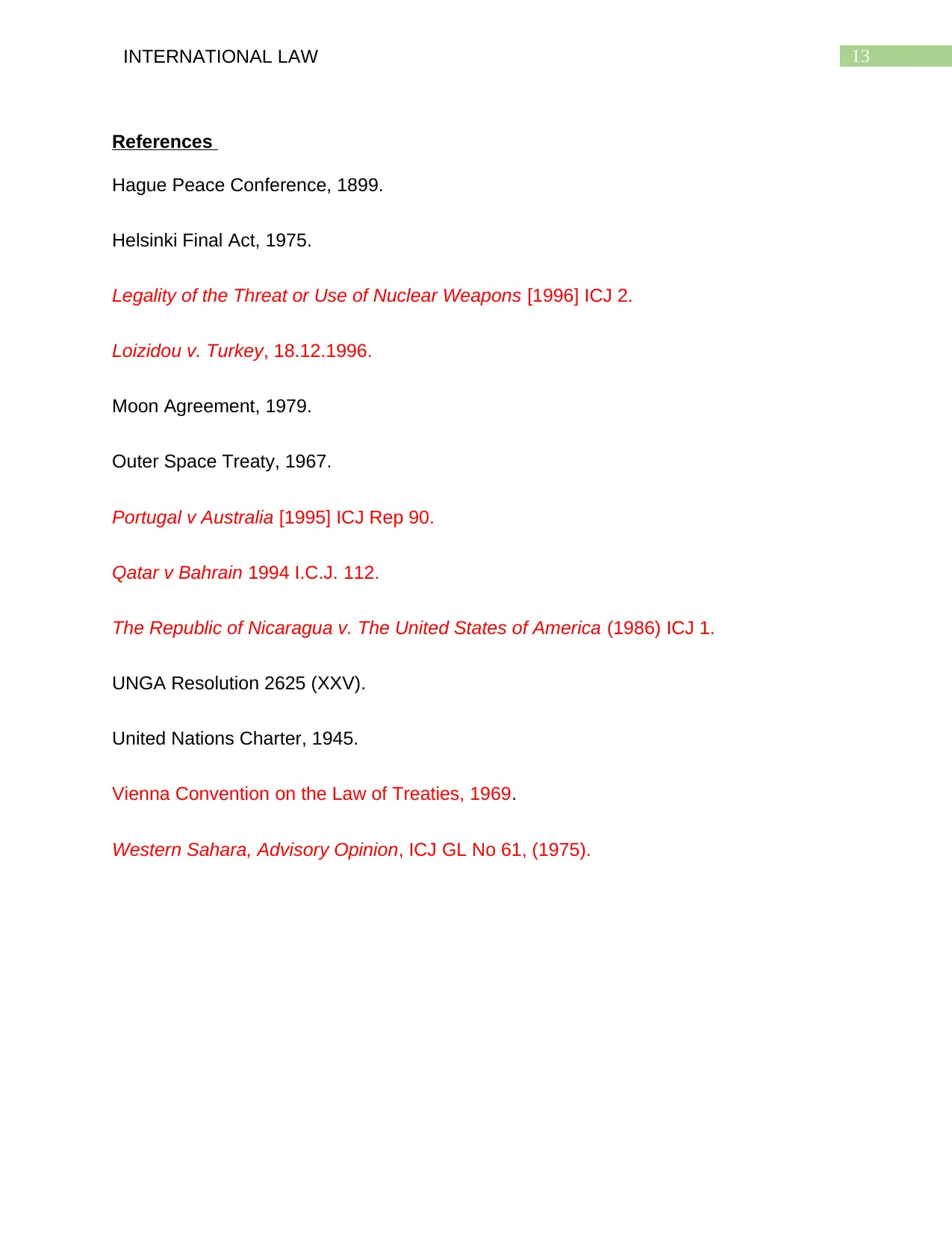
13INTERNATIONAL LAW
References
Hague Peace Conference, 1899.
Helsinki Final Act, 1975.
Legality of the Threat or Use of Nuclear Weapons [1996] ICJ 2.
Loizidou v. Turkey, 18.12.1996.
Moon Agreement, 1979.
Outer Space Treaty, 1967.
Portugal v Australia [1995] ICJ Rep 90.
Qatar v Bahrain 1994 I.C.J. 112.
The Republic of Nicaragua v. The United States of America (1986) ICJ 1.
UNGA Resolution 2625 (XXV).
United Nations Charter, 1945.
Vienna Convention on the Law of Treaties, 1969.
Western Sahara, Advisory Opinion, ICJ GL No 61, (1975).
References
Hague Peace Conference, 1899.
Helsinki Final Act, 1975.
Legality of the Threat or Use of Nuclear Weapons [1996] ICJ 2.
Loizidou v. Turkey, 18.12.1996.
Moon Agreement, 1979.
Outer Space Treaty, 1967.
Portugal v Australia [1995] ICJ Rep 90.
Qatar v Bahrain 1994 I.C.J. 112.
The Republic of Nicaragua v. The United States of America (1986) ICJ 1.
UNGA Resolution 2625 (XXV).
United Nations Charter, 1945.
Vienna Convention on the Law of Treaties, 1969.
Western Sahara, Advisory Opinion, ICJ GL No 61, (1975).
1 out of 14
Your All-in-One AI-Powered Toolkit for Academic Success.
+13062052269
info@desklib.com
Available 24*7 on WhatsApp / Email
![[object Object]](/_next/static/media/star-bottom.7253800d.svg)
Unlock your academic potential
© 2024 | Zucol Services PVT LTD | All rights reserved.